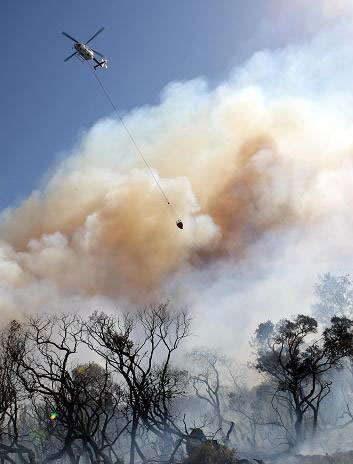Entire towns have been razed by wildfires raging through southeastern Australia, burning people in their homes and cars in the deadliest blaze in Australia's history. The number of dead Monday stood at 131, a grim toll that rose almost by the hour as officials reached further into the fire zone.

|
|
Entire towns have been razed by wildfires raging through southeastern Australia, burning people in their homes and cars in the deadliest blaze in Australia's history. The number of dead Monday stood at 131, a grim toll that rose almost by the hour as officials reached further into the fire zone.[Xinhua Photo]
|
Searing temperatures and wind blasts created a firestorm that swept across a swath of the country's Victoria state, where at least 750 homes were destroyed and all of the victims died.
"Hell in all its fury has visited the good people of Victoria," Prime Minister Kevin Rudd said. "It's an appalling tragedy for the nation."
If any of the deadly fires were deliberately lit, "There are no words to describe it other than mass murder," he said on Nine Network television.
The skies rained ash and trees exploded in the inferno, witnesses said, as temperatures of up 117 F (47 C) combined with blasting winds to create furnace-like conditions.
The town of Marysville and several hamlets in the Kinglake district, both about 50 miles (100 kilometers) north of Melbourne, were utterly devastated.
At Marysville, a winter tourism town that was home to about 800 people, up to 90 percent of buildings were in ruins, witnesses said. Police said two people died there.
"Marysville is no more," Senior Constable Brian Cross said as he manned a checkpoint Sunday on a road leading into the town.
At least 18 of the deaths were from the Kinglake area, where residents said the fire hit with barely any notice.
Mandy Darkin said she was working at a restaurant "like nothing was going on" until they were suddenly told to go home.
"I looked outside the window and said: 'Whoa, we are out of here, this is going to be bad,'" Darkin said. "I could see it coming. I just remember the blackness and you could hear it, it sounded like a train."
Only five houses were left standing out of about 40 in one neighborhood that an Associated Press news crew flew over. Street after street was lined by smoldering wrecks of homes, roofs collapsed inward, iron roof sheets twisted from the heat. The burned-out hulks of cars dotted roads. A church was smoldering, only one wall with a giant cross etched in it remained standing.
Here and there, fire crews filled their trucks from ponds and sprayed down spot fires. There were no other signs of life.
From the air, the landscape was blackened as far as the eye could see. Entire forests were reduced to leafless, charred trunks, farmland to ashes. The Victoria Country Fire Service said some 850 square miles (2,200 square kilometers) were burned out.
Rudd, on a tour of the fire zone, paused to comfort a man who wept on his shoulder, telling him, "You're still here, mate."